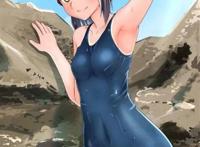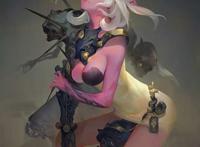疯狂山脉(II)(21)
At about 2:30 A.M., having decided to postpone further work and get a little rest, he covered the dissected organism with a tarpaulin, emerged from the laboratory tent, and studied the intact specimens with renewed interest. The ceaseless antarctic sun had begun to limber up their tissues a trifle, so that the head-points and tubes of two or three shewed signs of unfolding; but Lake did not believe there was any danger of immediate decomposition in the almost sub-zero air. He did, however, move all the undissected specimens closer together and throw a spare tent over them in order to keep off the direct solar rays. That would also help to keep their possible scent away from the dogs, whose hostile unrest was really becoming a problem even at their substantial distance and behind the higher and higher snow walls which an increased quota of the men were hastening to raise around their quarters. He had to weight down the corners of the tent-cloth with heavy blocks of snow to hold it in place amidst the rising gale, for the titan mountains seemed about to deliver some gravely severe blasts. Early Apprehensions about sudden antarctic winds were revived, and under Atwood’s supervision precautions were taken to bank the tents, new dog-corral, and crude aëroplane shelters with snow on the mountainward side. These latter shelters, begun with hard snow blocks during odd moments, were by no means as high as they should have been; and Lake finally detached all hands from other tasks to work on them.
 蓝湛疯狂的魏婴
蓝湛疯狂的魏婴






















